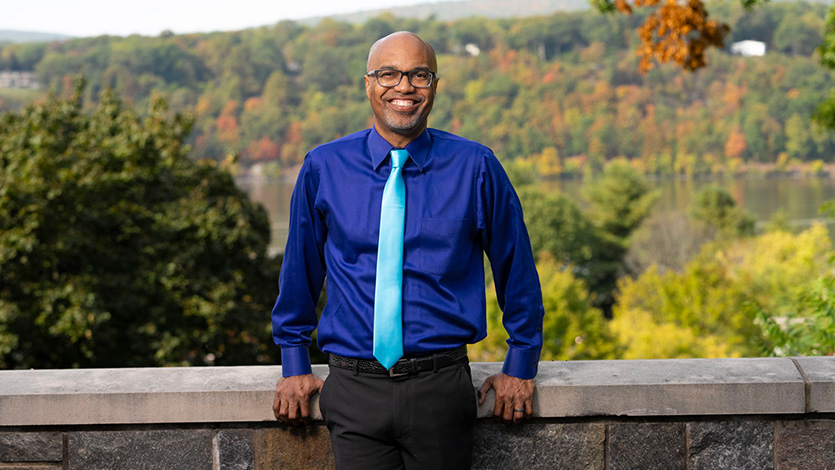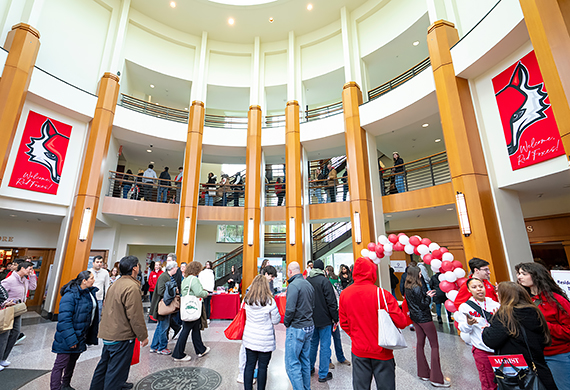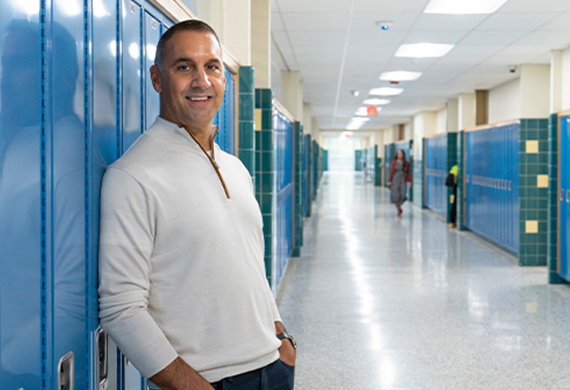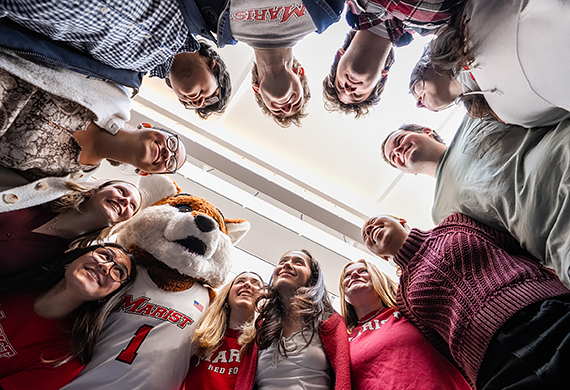Office Hours with Dr. Ron Buckmire, Dean of the School of Computer Science & Mathematics

Office Hours is a recurring segment where the Inside Marist team sparks conversations with key members of the campus community. Find out more about the inner workings of the College, gain fresh perspectives, and celebrate the invaluable contributions of those who make Marist the vibrant community that it is.
In this segment, Inside Marist’s Michelle Eggink interviews Dr. Ron Buckmire, Dean of The School of Computer Science and Mathematics. He earned his bachelor's, master's, and doctoral degrees in mathematics from Rensselaer Polytechnic Institute (RPI) and has been published in various peer-reviewed journals, including Data, Notices of the American Mathematical Society, and Journal of Humanistic Mathematics. In 2023, he was honored as a Fellow of the Society for Industrial and Applied Mathematics, becoming the first individual from a small liberal arts college, the fourth Black person, and the first openly LGBTQ+ recipient of this prestigious honor.
Q What do you do for fun outside of academia?
A: I love reading for fun, especially genre fiction like science fiction, thrillers, and murder mysteries. I occasionally share reviews of the books I read on my blog. I'm also a big tennis fan—while I used to play a lot, I mostly watch these days. I was a huge fan of Roger Federer and Serena Williams, and nowadays I love watching tennis players Carlos Alcaraz and Aryna Sabalenka.
Dr. Buckmire with his tennis equipment. Photo by Carlo de Jesus/Marist College.
Q What drew you to the role of dean at Marist?
A: Marist stood out to me because of its innovative programs and its strong commitment to experiential learning and career readiness. Leading an entire School of Computer Science and Mathematics was particularly appealing, as it aligns closely with all of my research interests. The school’s strengths in cybersecurity, its unique partnership with IBM, and its extensive computer equipment, which are resources not typically found at liberal arts colleges of Marist’s size, make it an extraordinary institution.
Q What’s something most people don’t know about you?
A: I think lots of people who have known me for years may not realize that I was not born in the United States. I was born on the tiny Caribbean island of Grenada and went to a public high school on the neighboring island of Barbados called Combermere. Some fun facts about Combermere are that it is much older than the United States (founded in 1695) and that both myself and Rihanna are “notable alumni”!
Dr. Buckmire with Grenada apparel. Photo by Carlo de Jesus/Marist College.
Q What inspired your academic journey, and how did you get into applied mathematics?
A: My journey began with a love for math and science in school, particularly chemistry and physics. While studying at Rensselaer Polytechnic Institute (RPI), I realized that the aspects of physics I enjoyed most were rooted in mathematics, leading me to switch to applied math. I gravitated to applied mathematics because I liked solving problems related to the real world. My career path began with my first academic job as a Minority Postdoctoral Scholar in Residence at Occidental College in Los Angeles. There, I discovered that I really enjoy the small liberal arts college environment, strong faculty-student relationships, and lots of opportunities for research endeavors.
Q How would you describe the faculty in the School of Computer Science and Mathematics?
A: The faculty here are incredibly dedicated and collaborative. Many have been with Marist for several years, which speaks to the strong sense of community within the school. Faculty from both departments (Computing Technology and Mathematics) work well together and consistently pitch in to support initiatives, creating a dynamic and supportive environment for both students and colleagues.
Dr. Buckmire in his office in Hancock. Photo by Carlo de Jesus/Marist College.
Q How do you envision guiding the school as technologies like AI, cybersecurity, and quantum computing evolve?
A: It’s an exciting time to be part of Computer Science and Mathematics, as technology continues to shape the world around us. We recently approved an applied AI minor, which will allow all Marist students, regardless of major, to explore and engage with artificial intelligence. It's essential to prepare Marist students to navigate a future where computation and AI play critical roles. Additionally, quantum computing is on the horizon, and the school is positioning itself to explore its potential.
Q You serve as the Vice President for Equity, Diversity, and Inclusion at the Society for Industrial and Applied Mathematics (SIAM), the largest professional society of its kind in the world. Talk to me about your approach to diversity, equity, and inclusion within Science, Technology, Engineering and Mathematics (STEM).
A: Diversity, equity, and inclusion have always been at the heart of my work. If there’s a DEI committee in a national math society I’ve either been on it or chaired it. Through initiatives like SIAM’s EDI Change Agents, we’re working to broaden participation and ameliorate underrepresentation in mathematics.
While some may view math as purely objective and detached from identity, I completely disagree. As a “math evangelist,” I am passionate about encouraging people from all backgrounds to see math as accessible and achievable, something everyone can engage with and excel in. Once you have more than one person involved in math, you have diversity. The question is what will your organization do to ensure everyone feels included? The hope is that organizations will change to allow everyone to participate equitably, in ways that make sense for them. So, diversity is a fact, inclusion is a choice, and equity is the ultimate goal.
Q What would you like people to know about the School of Computer Science and Mathematics?
A: The school is open and welcoming to all Marist students, even those who don’t see themselves as “math people.” We interact with math and computing every day, often without realizing it, and our programs are designed to make these subjects accessible and relevant to everyone. Regardless of your major or your background, the school provides opportunities to build skills and knowledge that will benefit you in any and every field in the future.
Q What excites you most about the research, mentorship, and unique opportunities available to students in the School of Computer Science and Mathematics?
A: There’s so much to be proud of in our school. The Marist-IBM Joint Study program gives students access to bleeding-edge technologies like quantum computing, an extraordinary opportunity that sets them apart from our peer institutions. Additionally, our applied AI coursework ensures students across disciplines can engage with transformative technologies. We also host panels, conferences, and research experiences that foster peer-to-peer mentorship and connect current students with alumni to explore diverse career paths.
Q How would you describe your leadership style?
A: My leadership style is collaborative, communicative, compassionate, and competent. I love alliteration! I believe in fostering teamwork, faculty mentorship, and developing the leadership capabilities of others. Open communication and compassion are essential, as they help build trust and create an environment where people feel supported. Competence is also critical, as it inspires confidence in those you lead.
Q What advice would you give to students in the School of Computer Science and Mathematics?
A: Embrace the liberal arts experience at Marist. While your technical skills will set you apart, exploring courses outside your major will make you a more well-rounded individual and a stronger team member. The ability to connect with people and work collaboratively across disciplines is a vital skill in any career.



